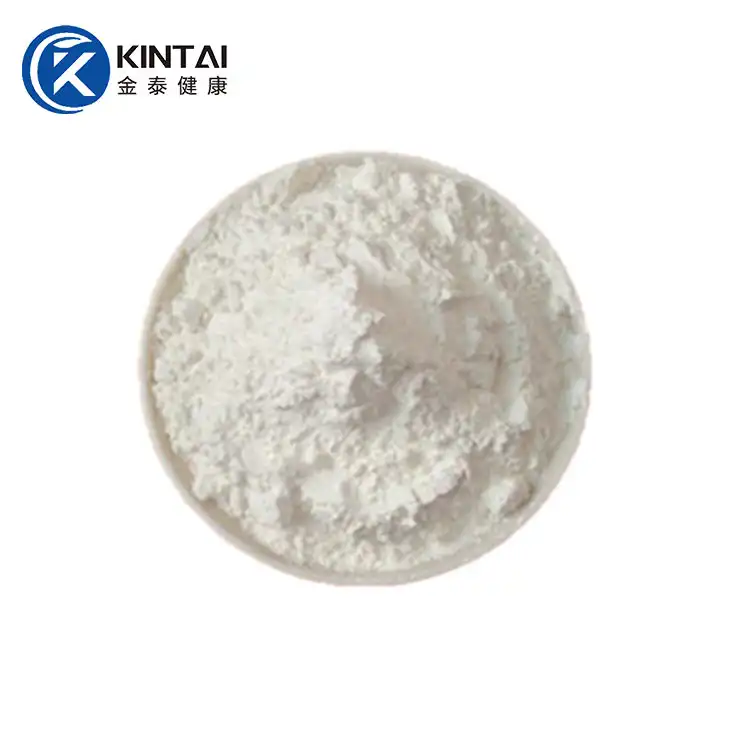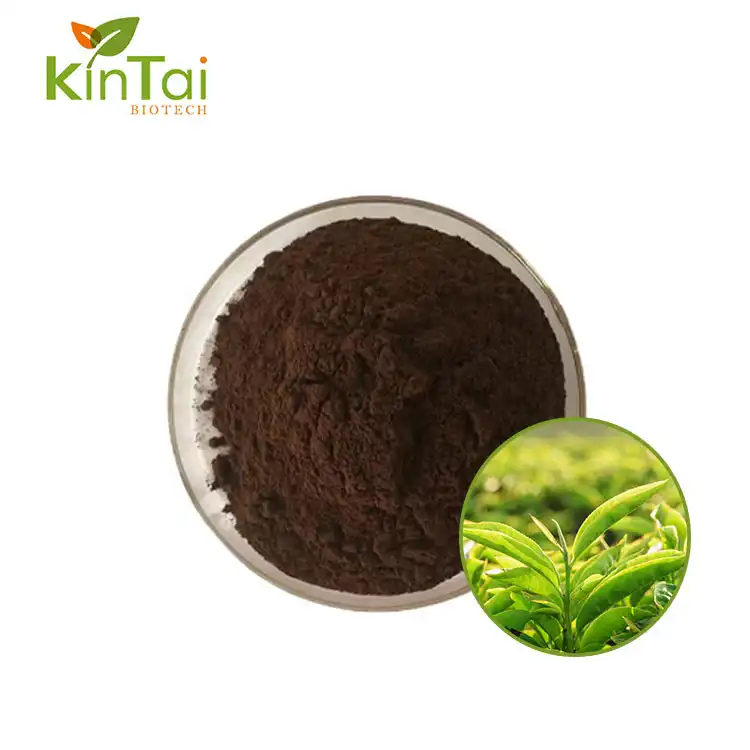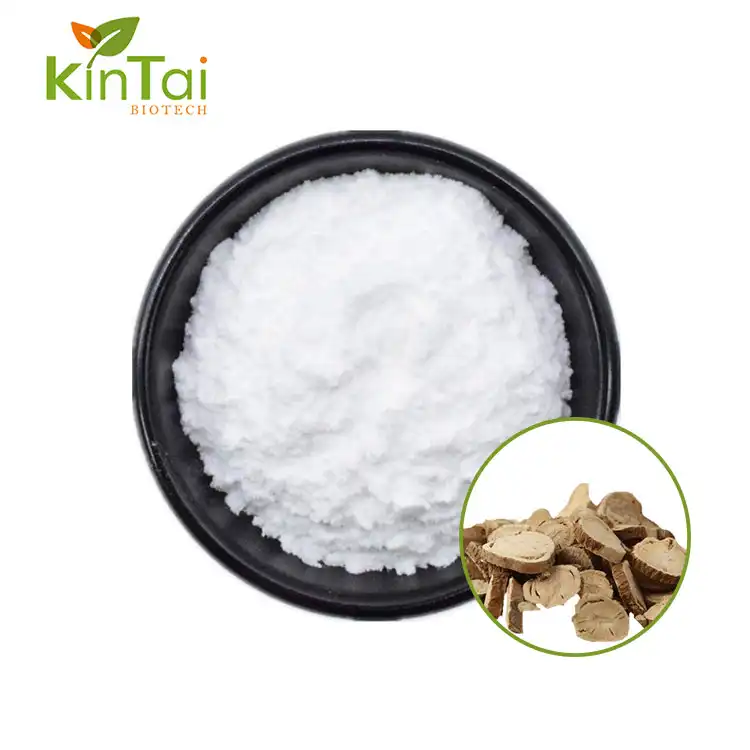What's the kaempferol benefits for skin?
2024-11-15 15:31:34
Sophora japonica fruit, a traditional Chinese medicine, contains kaempferol as one of its key active ingredients. This natural flavonoid compound endows Sophora japonica fruit extract with outstanding antioxidant capabilities, effectively neutralizing free radicals that cause skin aging. In skincare, kaempferol shows potential to brighten skin tone by inhibiting tyrosinase activity; simultaneously, its anti-inflammatory properties help soothe skin sensitivity and redness, and repair the skin barrier. Furthermore, it can help combat photoaging and delay wrinkle formation, protecting skin health and youthful appearance from multiple dimensions, making it a comprehensive natural skincare ingredient.
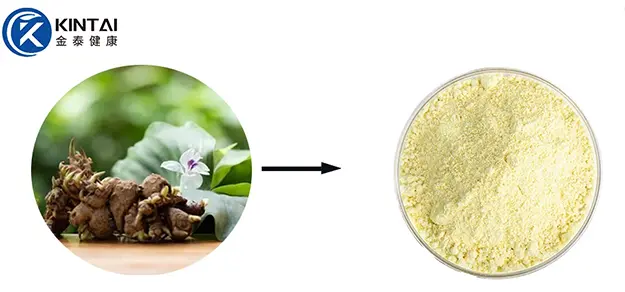
Kaempferol Benefits for Skin
1. Powerful Antioxidant, Combating Photoaging
- Mechanism: Kaempferol is a highly effective "free radical scavenger," directly neutralizing excess free radicals generated by external environmental factors such as UV rays and pollution, reducing oxidative stress.
- Efficacy: Effectively prevents the degradation of collagen and elastin, thereby delaying wrinkle formation and improving skin laxity, serving as a key defense against photoaging.
2. Inhibits Melanin, Brightens Skin Tone
- Mechanism: Intervenes in the melanin production pathway by inhibiting tyrosinase activity.
- Efficacy: Helps reduce pigmentation, lighten existing dark spots, and prevent the formation of new spots, achieving overall skin brightening and evenness. It is a gentle yet effective natural whitening ingredient.

3. Soothes and Reduces Inflammation, Repairs the Skin Barrier
- Mechanism: Effectively inhibits the release of various pro-inflammatory factors (such as TNF-α and IL-6), reducing internal skin inflammation.
- Efficacy: Ideal for soothing irritated and reddened skin, and also has a certain anti-inflammatory and calming effect on acne-prone skin. By reducing inflammation, it helps maintain and repair a healthy skin barrier.
4. Anti-glycation, improving dull skin tone
- Mechanism: Kaempferol can reduce the formation of advanced glycation end products (AGEs).
- Effects: Helps reduce dullness and loss of elasticity caused by glycation, making skin look brighter and younger.

Other benefits of Kaempferol
1. Powerful Antioxidant Effects: Kaempferol directly neutralizes free radicals (ROS) in the body, reducing oxidative stress-induced cell damage. This forms the basis of its many other benefits. It protects cell membranes, proteins, and DNA from oxidative damage, thus delaying aging and preventing various chronic diseases.
2. Excellent Anti-inflammatory Effects: It inhibits key inflammatory signaling pathways (such as NF-κB and MAPK), reducing the production of pro-inflammatory factors such as tumor necrosis factor-α (TNF-α) and interleukin-6 (IL-6). This helps alleviate diseases associated with chronic inflammation, such as arthritis, atherosclerosis, and neurodegenerative diseases.
3. Protects Cardiovascular Health: It works through multiple pathways, including antioxidant and anti-inflammatory effects, inhibition of vascular smooth muscle cell proliferation, and promotion of vasodilation.
4. Promotes Bone Health: It promotes osteoblast activity and differentiation while inhibiting osteoclast formation, thereby regulating bone metabolism balance. This helps increase bone density and prevent osteoporosis.
5. Anti-diabetic effects: Improves insulin sensitivity, protects pancreatic β cells, and inhibits intestinal α-glucosidase activity (slows down carbohydrate absorption). Helps lower blood sugar levels and improve insulin resistance.
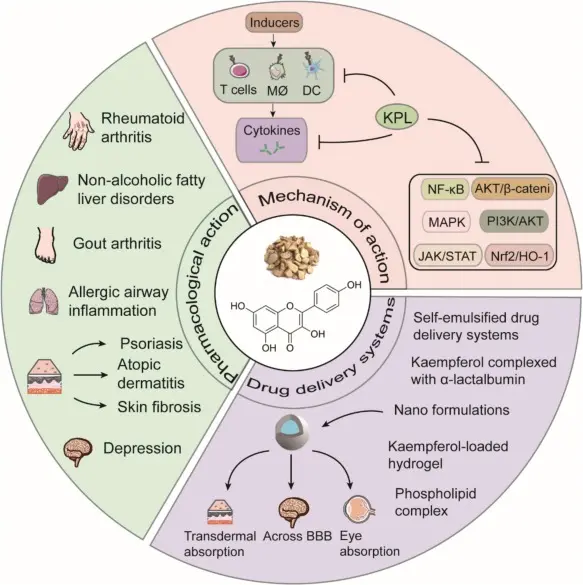
Kaempferol Formula in Skincare
1. Kaempferol + Vitamin C (and its derivatives), Vitamin E, Ferulic Acid:
Kaempferol, when combined with Vitamin C, Vitamin E, and ferulic acid, forms a powerful antioxidant synergistic network. This combination is considered a "golden pairing" because kaempferol not only directly scavenge free radicals but also activates the skin's own antioxidant defense system (Nrf2 pathway), complementing the water-oil synergistic protection mechanism of Vitamins C and E. This multi-target synergistic effect provides the skin with more comprehensive and lasting photoaging protection than single ingredients, jointly resisting wrinkle formation and pigmentation.
2. Kaempferol + Niacinamide, Arbutin, Kojic Acid, Azelaic Acid:
The combination of kaempferol and niacinamide can inhibit melanin production through multiple pathways. Kaempferol primarily inhibits tyrosinase activity at the source, reducing melanin "production"; while niacinamide excels at blocking the "transportation" of melanin to epidermal cells. Together, they form a dual interception from production to transport, thus more effectively targeting pigmentation problems such as blemishes and acne scars, achieving overall brightening and evenness of skin tone.
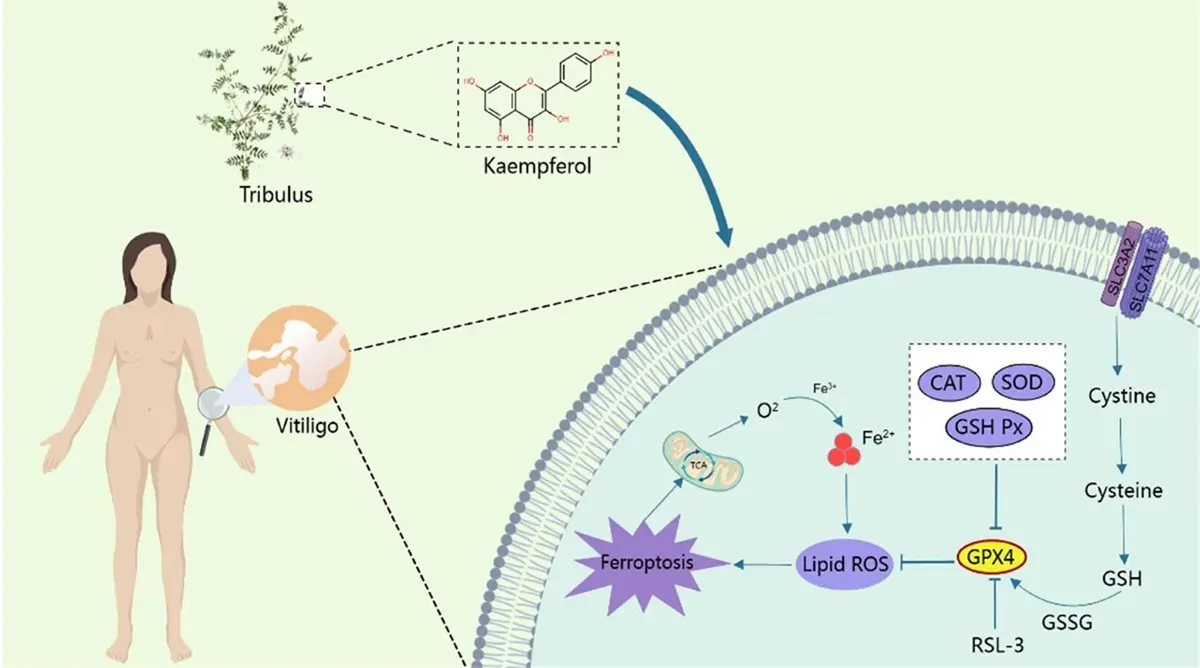
3. Kaempferol + Bisabolol, Centella asiatica glycoside, Ceramide, Oat Alkaloids:
Kaempferol, combined with soothing ingredients such as bisabolol and centella asiatica glycoside, can exert a synergistic effect in anti-inflammation and repair. By acting on different inflammatory signaling pathways (such as NF-κB and TNF-α), they work together to combat skin inflammation, quickly relieving redness, stinging, and other discomfort. Simultaneously, this complex system can also help repair the damaged skin barrier, fundamentally enhancing skin resistance, making it especially suitable for daily care and stabilization of sensitive and acne-prone skin.
Kaempferol Side Effects
- Skin irritation: This is the most significant potential risk. For some individuals, especially those with highly sensitive skin or intolerance to certain ingredients, kaempferol may cause:
- Contact dermatitis: Manifests as redness, swelling, itching, and a rash.
- Stinging or burning sensation: Especially when the skin barrier is compromised (e.g., eczema, thin stratum corneum).
- Allergic reactions: Although uncommon, any natural or chemical substance can potentially be an allergen. Individuals allergic to plant pollen or related plants may have a slightly higher risk of cross-reactivity.
- Concentration dependence: Safety is highly dependent on the concentration used in the product. Higher concentrations may result in greater efficacy, but the risk of irritation also increases accordingly. A safe and effective concentration range is typically used in cosmetics.
- Interactions with other ingredients: Currently, there is limited data on the interactions of kaempferol with other topical active ingredients (such as glycolic acid, retinol, and high-concentration vitamin C). For safety reasons, it is not recommended to mix high-concentration functional products without guidance.
KINTAI Kaempferol Powder
- Pure Natural Source: Kintai's kaempferol is extracted from natural plants, ensuring the greenness and purity of the ingredients. This avoids the irritation and residues that synthetic chemicals may cause, resulting in better skin affinity.
- Highly Customizable Services: Kintai can provide kaempferol raw materials in various specifications and purities to meet the specific formulation needs of different clients, enabling precise application and personalized customization to help you create differentiated products.
- Authoritative International Certifications: Kintai holds multiple international certifications such as ISO, HACCP, HALAL, KOSHER. The authority of its production system and quality standards provides a solid guarantee for the safety, efficacy, and global market access of its products.


